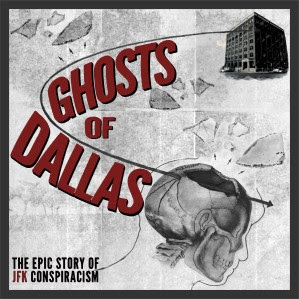The full audio of Ike Pappas’s radio coverage of Oswald’s murder can be heard here on David Von Pein’s YouTube channel.
On the armored truck ruse, and the argument for taking Oswald out via the ground floor, see Vincent Bugliosi, Four Days in November, pp. 421-428.
“He never expected to spend a night in jail” … quoted in Gerald Posner, Case Closed, p. 397.
For the Dallas newspaper poll regarding Ruby’s punishment see Bugliosi, Reclaiming History, p. 1467.
“He knocked him down the stairs and out the door ..." quoted in Kennedy’s Avenger, by Dan Abrams and David Fisher, p. 215. See also this contemporary report in the New York Times.
“It was well known that Jack Ruby was Meshuggah ..." quoted in Bugliosi, Reclaiming History, p. 1130.
“She is very noisy and uses obscene language ..." quoted in Bugliosi, Reclaiming History, p. 1085.
The clip of Ruby’s press conference is here. All other clips of Ruby talking come from the so-called “deathbed interview” conducted by at Parkland Hospital by his attorney, Elmer Gertz, and his brother, Earl Ruby. The full audio of that interview is here,
“A town character … " and "He was like horseshit ..." and "If there was one Ruby trait that stands out" are all quoted in Posner, Case Closed, p. 373.
“Evidently I took a little domineering part about me ..." See Ruby's Warren Commission testimony here.
“I felt that I was deputised as a reporter momentarily, you might say ..." ditto.
“You can’t go in there, Jack." See the Warren Commission testimony of Victor F. Robertson, Jr. here.
“Henry, I want you to know I was the one that corrected you” and a "childish" thing to do. See Ruby's Warren Commission testimony.
Oswald “looked like Paul Newman.” See the Warren Commission testimony of Russell Lee Moore (aka Russ Knight) here.
Ruby offers to cover for transfer for KLIF radio. See Bugliosi, Four Days in November, p. 397.
“My Dear Caroline” letter, see Bugliosi, Four Days in November, pp. 401-402
“That caused me to go like I did … It all happened that Sunday morning" etc., are from Ruby's Warren Commission testimony.
For George Senator's observations of Ruby's movements that morning, see his Warren Commission testimony here.
“… And I drove past Main St ..." Ruby, Warren Commission testimony.
Ruby was in no hurry and left the Western Union walking in “an ordinary gait” ... see the Warren Commission testimony of Doyle E. Lane here.
The cop who booked Oswald out of the jail office in the City Hall basement logged the time as 11.20 ... see the Warren Commission testimony of Willie B. Slack here.
Police dispatcher radioed for an ambulance at 11.21 ... see the Warren Commission testimony of Frances Cason here.
Bill Alexander on Ruby and Sheba: quoted in Posner, Case Closed, p. 392.
Officer Roy Vaughn's account of guarding the Main St ramp comes from his Warren Commission testimony, which is here.
“I had the gun in my right hip pocket and impulsively, if that is the correct word here ..." is from Ruby's Warren Commission testimony.
"If it was a conspiracy" it was “the most perfect conspiracy in the history of the world … " comes from a court appearance of Jack Ruby's quoted here.
Lattimer on the path of Ruby's bullet is quoted in Posner, Case Closed, pp. 395-396.
Mark Lane on Ruby's "perfectly placed" shot: Lane, Rush to Judgment, p. 272.
“Some day a list must be compiled …” Penn Jones, Forgive my Grief, p. 5
Richard Feynman's license plate riff comes from Six Easy Pieces, p. xxi.
Sylvia Meagher's quote about the case offending “those who seek meaning in human affairs and do not conceive of history as governed by random, irrational and incessant coincidence” comes from her book Accessories After the Fact, p. 268.
History is "the story of everything that needn't have been like that": Clive James, Cultural Amnesia, p. 15.
